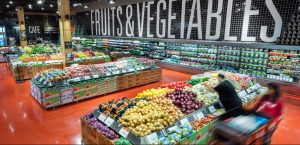 Loblaw Cos. Ltd. has posted Q3 earnings of $777 million, or $2.53 per share, up from $621 million ($1.95) a year earlier. Revenues rose to $18.54 billion from $18.27 billion in the comparable period last year, falling short of analyst estimates of $18.65 billion. Same-store sales at the company’s grocery banners grew by 0.5 percent.
Loblaw Cos. Ltd. has posted Q3 earnings of $777 million, or $2.53 per share, up from $621 million ($1.95) a year earlier. Revenues rose to $18.54 billion from $18.27 billion in the comparable period last year, falling short of analyst estimates of $18.65 billion. Same-store sales at the company’s grocery banners grew by 0.5 percent.
Archives
CHPTA and COPA to honour Hardlines president, former Ace Canada head
 The Canadian Home Products Trade Association (CHPTA) and the Canadian Office Products Association (COPA) will present a joint conference on Nov. 21 in Richmond Hill, Ont. Participants will hear from speakers on a range of subjects from AI to the economy and consumer behaviour.
The Canadian Home Products Trade Association (CHPTA) and the Canadian Office Products Association (COPA) will present a joint conference on Nov. 21 in Richmond Hill, Ont. Participants will hear from speakers on a range of subjects from AI to the economy and consumer behaviour.
The program includes a luncheon to honour two new inductees to the Canadian Hardware & Housewares Industry Hall of Fame. Hardlines president Michael McLarney will be recognized alongside industry veteran Bill Morrison (pictured), former president of Ace Canada and TruServ Canada. Click here for more information and to register.
Premium Members save on our Retail, Market Share reports
 The 2024 Hardlines Retail Report is now available. This massive feat of research breaks out the size and growth annually of the industry, identifying which retail sectors and which banners are winning and losing from year to year. Click here for more info and order details. Premium Member (subscribers to our flagship Hardlines Weekly Report) save big, including a bundled discount with the Retail Report’s companion piece the Hardlines Market Share Report.
The 2024 Hardlines Retail Report is now available. This massive feat of research breaks out the size and growth annually of the industry, identifying which retail sectors and which banners are winning and losing from year to year. Click here for more info and order details. Premium Member (subscribers to our flagship Hardlines Weekly Report) save big, including a bundled discount with the Retail Report’s companion piece the Hardlines Market Share Report.
Home Depot earnings fall on higher sales
Montreal Port Authority warns of consequences amid labour dispute
 The Montreal Port Authority (MPA) is sounding the alarm on the severe economic consequences of a prolonged labour disruption at the port. On Sunday night, the Port of Montreal locked out 1,200 longshoremen, amplifying already strained relations between the Maritime Employers Association (MEA) and the Port of Montreal longshore workers’ union CUPE Local 375. Shipping lines are already diverting their vessels to other East Coast ports.
The Montreal Port Authority (MPA) is sounding the alarm on the severe economic consequences of a prolonged labour disruption at the port. On Sunday night, the Port of Montreal locked out 1,200 longshoremen, amplifying already strained relations between the Maritime Employers Association (MEA) and the Port of Montreal longshore workers’ union CUPE Local 375. Shipping lines are already diverting their vessels to other East Coast ports.
Sarah McGoldrick
Building permits rise in September
The total value of building permits in Canada increased by $1.3 billion or 11.5 percent to $13.0 billion in September, according to StatCan. Gains were led by Ontario, where construction intentions grew by $1.2 billion or 25.0 percent to $5.9 billion. Construction intentions for the residential sector rose by $540.7 million (7.5 percent) to $7.7 billion, with the single-family component up by $35.1 million.
Canac breaks ground in Drummondville
Canac has begun its largest construction project ever, a 625,000-square-foot building at its Drummondville, Que., distribution facility. The company, which is celebrating its 150th anniversary next year, will invest more than $100 million in the project, expanding the campus’s footprint to about 1.2 million square feet.
Canac executives were joined by several dignitaries for the groundbreaking ceremony. They included Drummondville mayor Stéphanie Lacoste, federal and provincial legislators, the local city councillor, and a representative of the region’s economic development office.
Taiga’s Q3 impacted by commodity sales
Taiga Building Products has reported that its Q3 sales amounted to $423.9 million, down from $456.6 million in the comparable period of last year. Sales fell by $32.7 million or 7.0 percent, a decline attributed to a reduction in commodity products sold. Net earnings decreased to $14.3 million from $21.4 million.
Crown Building Supplies wins Board of Trade award
 Crown Building Supplies, which opened its third location in Burnaby, B.C., in September, has won an award from the local Surrey Board of Trade. Last week at the association’s business excellence awards gala, Crown won in the category of Employer Over 41 People. (Pictured: Gary and Jas Sangha, the co-owners of the pro-focused chain.)
Crown Building Supplies, which opened its third location in Burnaby, B.C., in September, has won an award from the local Surrey Board of Trade. Last week at the association’s business excellence awards gala, Crown won in the category of Employer Over 41 People. (Pictured: Gary and Jas Sangha, the co-owners of the pro-focused chain.)
Drivers at a Metro Vancouver Walmart store are unionizing
 Drivers for Walmart’s Surrey, B.C., store have won interim certification from the Canada Industrial Relations Board. The move allows them to form a bargaining committee and work with representatives of Unifor, Canada’s largest private-sector union, to negotiate their first collective agreement with Walmart.
Drivers for Walmart’s Surrey, B.C., store have won interim certification from the Canada Industrial Relations Board. The move allows them to form a bargaining committee and work with representatives of Unifor, Canada’s largest private-sector union, to negotiate their first collective agreement with Walmart.
The Surrey drivers follow on the success of workers at Walmart’s Mississauga, Ont., warehouse, which in September became the first of the company’s Canadian DCs to unionize.


